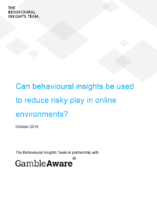The rise of online gambling means that placing a bet is only ever a few clicks away. This increased accessibility has been a boon for the majority of gamblers who play safely. However, for those that are negatively affected by gambling, increased accessibility poses a risk of financial, social or health related harm.
GambleAware became interested in behavioural insights as one way of addressing this challenge, following successful application in a broad range of other social issues. As such, GambleAware commissioned the Behavioural Insights Team (BIT) to conduct the third phase of a remote gambling research programme, which aims to support operators in reducing problem gambling.
This report describes the activities conducted as part of the first part of this phase, comprising a review of the academic literature, a qualitative study, a mystery shopping exercise, a review of existing operator practices, a data science analysis, and two randomised controlled trials.
As part of this project, we sought to understand which behavioural influences might be most relevant to online gambling. Our first step was to conduct a review of the relevant behavioural literature including:
- Exploring gambling trends in the UK
- Reviewing how problem gambling is best defined, conceptualised, and measured
- Examining key features of remote gambling that influence gambling behaviour
- Considering effectiveness of behavioural interventions



